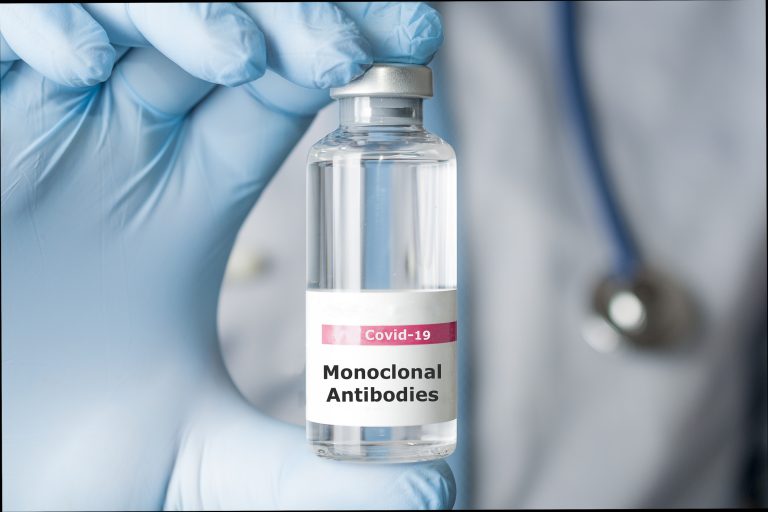
Regeneron announced “encouraging” early data from an ongoing Phase 1/2/3 clinical trial of its antibody cocktail, casirivimab and imdevimab, in about 500 hospitalized COVID-19 patients requiring low-flow oxygen. The results show that, compared to placebo, after one week of treatment the cocktail reduced the risk of death or need for mechanical ventilation by about half in seronegative patients—those who had not yet mounted their own immune response to SARS-CoV-2. Based on this analysis the trial will continue.
Viral loads were substantially affected by the treatment. At the time patients were randomized, seronegative patients (n=217) had much higher viral loads than who were seropositive (those already generating their own antibodies). But through the first week of the trial their viral loads were reduced by more than twice the level as those on the placebo. The antibody cocktail was much less effective in seropositive patients (n=270), but that was expected based on earlier studies.
These results, combined with earlier data from analysis of the first 275 patients that was released in September, reinforce the idea that a patient’s own immune response is important in controlling the progress of the infection. The earlier trial looked at the treatment’s ability to reduce symptoms in non-hospitalized patients. In that study, the cocktail rapidly reduced viral load in seronegative patients through the first week. Clinical evidence from the trial suggested that monoclonal antibodies, like this cocktail, have the greatest benefit when given early, in patients who are seronegative, and/or who have a high viral load.
Regeneron’s cocktail is the first antibody treatment to demonstrate an anti-viral effect in COVID-19 patients. In November, it was granted an Emergency Use Authorization (EUA) by the U.S. FDA for high-risk patients with confirmed COVID-19, but who are not hospitalized. The cocktail was created using fully-human antibodies produced by Regeneron’s VelocImmune genetically modified mice as well as from patients who have recovered from the disease. The two antibodies it contains bind non-competitively to the receptor binding domain of the virus’s spike protein.
It appears the treatment is the most useful in patients at highest risk. “In this trial, patients who had not yet mounted their own immune response had much higher viral loads and much worse clinical outcomes; for example in the placebo group, seronegative patients were almost three-times more likely to die compared to seropositive patients,” said George D. Yancopoulos, M.D., Ph.D., president and chief scientific officer at Regeneron.
He added that: “Moreover, the data from these trials in hospitalized and non-hospitalized patients suggest that Regeneron’s antibody cocktail may compensate for an inadequate endogenous antibody response by reducing viral levels and the risk of adverse clinical outcomes.”
In this latest trial, patients were randomized to receive the antibody cocktail (either 8,000 mg high dose or 2,400 mg low dose) or placebo, in addition to standard-of-care therapies, with 67% receiving remdesivir and 74% receiving systemic corticosteroids. Both doses showed similar clinical and virologic efficacy, and both were well-tolerated. In the overall trial population, the incidence of serious adverse events was 21% for high dose, 20% for low dose and 24% for placebo. Infusion reactions were rare and were more common with the high dose of the antibody cocktail.
Yancopulos noted that much larger trials will be required to “rigorously characterize” the treatment’s efficacy and the company believes in addition to this ongoing trial, the U.K.-based RECOVERY trial can help provide some of that data. RECOVERY has already enrolled more than 2,000 hospitalized patients in a study that will compare the antibody cocktail to standard-of-care compared to standard-of-care alone. RECOVERY is also examining efficacy of low-dose dexamethasone in children, colchicine, tocilizumab, convalescent plasma, and aspirin. This trial recruits any hospitalized patients regardless of the severity of their condition.













